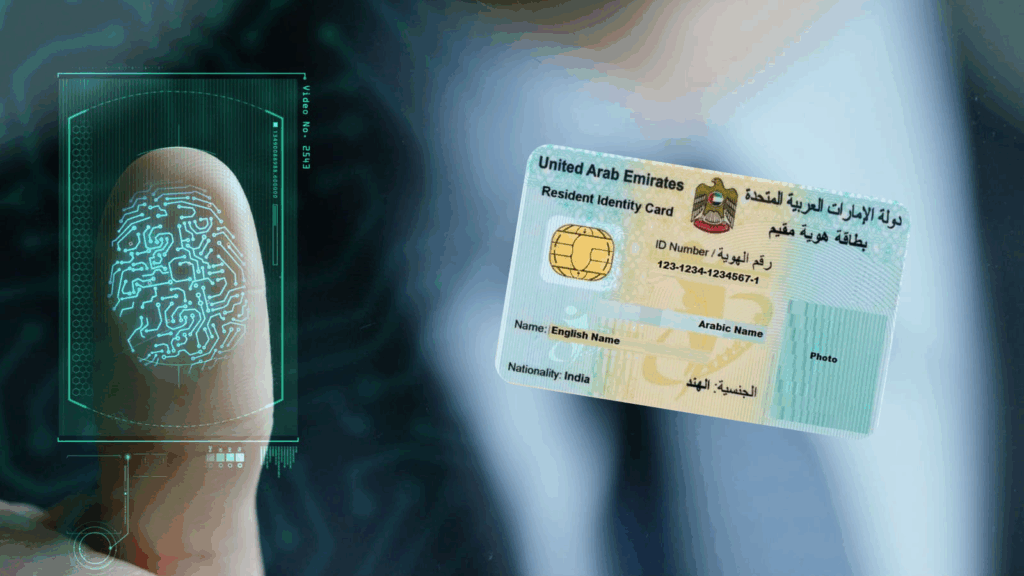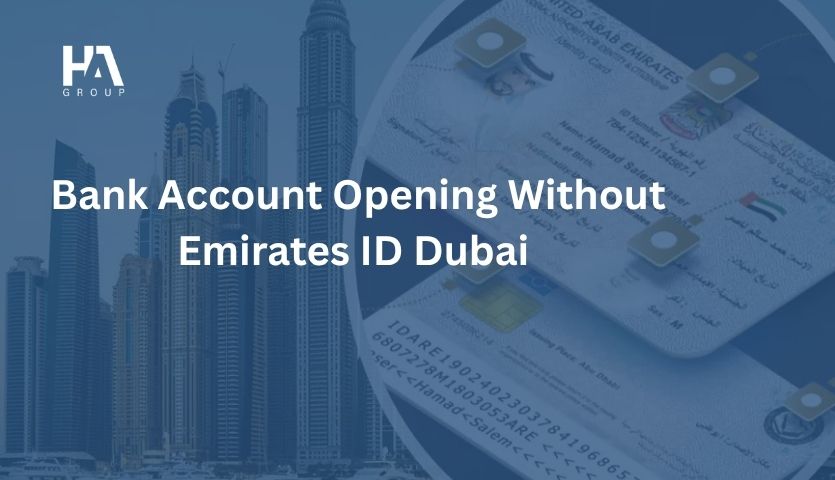Opening a corporate bank account in Dubai can be one of the trickiest steps for entrepreneurs. Especially if you don’t yet have an Emirates ID. Many business owners who’ve just set up a company or are still waiting for their residence visa face this problem. The good news? In some cases, you can open a bank account without Emirates ID in Dubai, but it depends on your company structure, documentation, and how the bank views your business.
This guide breaks down what’s actually possible in 2025, based on the latest UAE banking policies and real-world experience assisting hundreds of clients at HA Group.
Why Banks Ask for Emirates ID
The Emirates ID is the national identification document in the UAE. It’s used by banks to verify the identity and residency status of individuals connected to a company—directors, shareholders, and authorised signatories.
According to the UAE Government Portal, the Emirates ID is mandatory for UAE residents opening a bank account, as part of anti-money-laundering (AML) and know-your-customer (KYC) checks.

But there’s an important distinction here: corporate accounts are opened in the name of a company, not an individual. So, while Emirates ID is required for resident signatories, it is not always mandatory for foreign shareholders or non-resident owners—as long as your company is properly licensed and can prove legitimate business activity.
Can You Open a Corporate Bank Account Without Emirates ID?
Yes, but not under all circumstances. If your company has been incorporated in a UAE free zone (such as DMCC, IFZA, Meydan, or Dubai South), and you or your partners do not yet hold residency visas, certain banks may allow you to open a non-resident corporate bank account.
In such cases, the account opening process relies on corporate documentation and shareholder verification instead of Emirates ID. However, you can expect more rigorous compliance checks, higher minimum balance requirements, and longer approval timelines compared to standard resident accounts.
Local banks assess each case individually. They want to understand your company’s purpose, ownership, and financial background before granting access to the UAE banking system.
As Khaleej Times explains, UAE banks have tightened their Know Your Customer (KYC) and Anti-Money Laundering (AML) procedures over the past few years to align with international transparency standards. The Central Bank of the UAE has introduced several initiatives under its 2024–2027 AML strategy, requiring all financial institutions to enhance verification and reporting measures.
Typical Scenarios Where It’s Possible
Below are the most common situations where a bank account opening without Emirates ID in Dubai is possible for businesses:
1. Newly Established Free-Zone Companies
If your company is newly incorporated and you’re waiting for your residency visa and Emirates ID, some banks will open the account using your passport, company trade licence, and shareholder documents. You’ll typically need to submit the Emirates ID once it’s issued.
2. Non-Resident Shareholders
For companies owned by non-residents or foreign corporate entities, the account can often be opened under non-resident corporate status. The bank will verify the parent company’s incorporation documents, business model, and the source of funds.
3. Companies with a Resident Signatory
If at least one authorised signatory already has an Emirates ID, the process becomes much smoother. The bank can proceed under that person’s credentials while still listing non-resident shareholders in the account documentation.
What Documents You’ll Need
Even without an Emirates ID, banks will ask for extensive documentation to satisfy UAE Central Bank regulations. The standard requirements in 2025 include:
- Trade licence (valid and active)
- Certificate of incorporation and Memorandum of Association
- Board resolution authorising account opening
- Passports of all shareholders and authorised signatories
- Proof of business activity, such as contracts, invoices, or business plans
- Bank reference letter or six-month statement from an existing bank account
- Utility bill or tenancy contract for proof of address
Most UAE banks, including Emirates NBD and ADCB, will not finalise account activation until they have verified both the company’s operations and the personal credentials of the authorised signatories.
This means that if you’re operating without an Emirates ID, it’s vital to prepare every other document carefully to avoid delays.
Challenges to Expect
Opening a corporate bank account in Dubai without Emirates ID isn’t straightforward. You should be aware of the following:
1. Stricter KYC and Due Diligence
Banks will conduct deeper background checks on non-resident shareholders and companies. They may request additional documents such as business plans or client lists to verify genuine activity.
2. Higher Minimum Balances
Non-resident or limited accounts often come with higher minimum balance requirements—typically between AED 50,000 and AED 500,000, depending on the bank’s policy and your company profile.
3. Longer Processing Time
While resident corporate accounts can be opened within 2–3 weeks, non-resident setups can take 6–8 weeks or more. Delays usually occur during compliance and source-of-funds verification.
4. Limited Services
Without Emirates ID, you may have access only to basic banking functions (e.g., deposits, transfers) until residency details are provided. Services like corporate credit cards, cheque books, and trade finance might be restricted.
How to Improve Your Chances of Approval
If you’re applying for a corporate bank account without Emirates ID, here’s what can help:
- Choose the right jurisdiction: Free zones such as DMCC or IFZA are well-recognized by banks and make the process smoother.
- Provide complete documentation: Missing paperwork is the top reason for rejections. Prepare your trade licence, passport copies, MoA, and contracts upfront.
- Show real business activity: Demonstrate your company’s legitimacy through invoices, agreements, or a business website.
- Maintain transparency: Be clear about your business model, client locations, and expected transaction volume.
- Work with a local advisor: Firms like HA Group can pre-screen your documents and recommend banks most likely to accept your profile, saving weeks of back-and-forth.
Banks That Commonly Work with Non-Resident Companies
While policies vary, the following local and international banks are known to consider applications from companies without Emirates ID (subject to compliance review):

- Emirates NBD – offers flexible business banking for Free-Zone and offshore firms.
- ADCB – known for structured onboarding of foreign shareholders with strong documentation.
- RAKBANK – often supports SMEs and non-resident entrepreneurs if business activity is clear.
Each bank’s policy evolves frequently, so it’s best to confirm the latest requirements before submitting an application.
Step-by-Step Overview
- Form your company in a UAE Free Zone or on the Mainland.
- Gather all documents, including trade licence, incorporation papers, and passport copies.
- Select a bank that accepts non-resident or pending-ID applications.
- Submit pre-approval—many banks now offer digital screening before full application.
- Attend a compliance interview or verification call if required.
- Deposit the minimum balance after approval and activate your account.
- Update your Emirates ID with the bank once available to unlock full functionality.
FAQ
Can I open a UAE corporate account without Emirates ID?
Yes, in specific cases, especially if your company is registered in a Free Zone and you can provide strong documentation proving legitimate business operations.
Do all shareholders need Emirates ID?
No. Only authorised signatories and residents need it. Foreign shareholders can open accounts under non-resident status with valid passports.
Will I need to provide Emirates ID later?
Usually yes. Banks may allow you to start the process without it but will require Emirates ID once residency formalities are complete.
Final Thoughts
Opening a corporate bank account in Dubai without Emirates ID is possible—but it requires preparation, transparency, and patience. UAE banks are open to global investors, yet they must comply with strict Central Bank and AML standards.
At HA Group, we’ve seen that the most successful applications come from businesses that plan ahead—choosing the right Free Zone, preparing all corporate documents, and being ready to demonstrate genuine commercial intent.
If you need professional help navigating the process, our team can guide you step-by-step, recommend suitable banks, and handle all paperwork until your account is approved.
Ready to open your corporate bank account in Dubai?
Rcommended Articles:
Dubai Corporate Tax New Rules 2025: What Businesses Need to Know
Can a Tourist Open a Bank Account in Dubai?
Common Challenges in Opening Business Bank Accounts in UAE
Documents Required to Open a Business Account in Dubai – 2025 Guide
How Long Does It Take to Open a Business Bank Account in Dubai in 2025?







